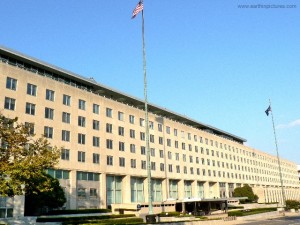By Nicholas Kralev
The Washington Times
April 29, 2010
A dispute over the State Department budget has pitted the chairman of the Senate Budget Committee, Sen. Kent Conrad of North Dakota, against a fellow Democrat and head of the Foreign Relations Committee, Sen. John F. Kerry of Massachusetts, and the Obama administration.
Mr. Conrad led an effort to slash President Obama’s $58 billion international affairs request for 2011 by $4 billion, a cut his committee approved last week. Despite protests from Secretary of State Hillary Rodham Clinton and all her living predecessors, the senator stood his ground on Wednesday.
“The fact is that international funding has grown significantly in recent years,” he said. “Budgets are about setting priorities. Our budget provides a responsible and balanced approach.”
While the reduced plan “will cover the increased funding requested by [Mr. Obama] for our efforts in Iraq, Afghanistan and Pakistan, as well as our efforts for the Middle East peace process, the president’s other new international initiatives will have to compete for funding within the rest of the international budget,” he said.
The Budget Committee’s “markup” of Mr. Obama’s request is not the Senate’s last word, which belongs to the Appropriations Committee. Congressional officials and analysts said the Appropriations Committee rarely goes against the Budget Committee’s vote, but it did last year after an amendment passed on the Senate floor reversed a similar cut Mr. Conrad had made.
That amendment was championed by Mr. Kerry, who already has begun another fight with Mr. Conrad by accusing his colleague of putting “into jeopardy key foreign-policy and national security priorities.”
“In this difficult budget climate, we all have to make tough choices, but the international affairs account is a smart, cost-effective investment that should be funded appropriately,” Mr. Kerry said. “Shortchanging these programs delivers very little budget relief at enormous cost to our global efforts and America’s leadership in the world.”
As a counterpoint to Mr. Conrad’s actions, Mr. Kerry on Tuesday engineered the first bipartisan approval of a White House budget request by the Foreign Relations Committee in five years.
“This is the first time since 2005 that we have passed a State Department authorization bill,” he said. “It provides our diplomats and development experts the tools and guidance needed to advance our interests and national security priorities both now and in the future.”
Although Mr. Conrad’s plan received enough votes to pass his committee, his opponents have been much more vocal in public.
Both Mrs. Clinton and Defense Secretary Robert M. Gates sent letters to Mr. Conrad before the committee meeting, asking him to support the full budget request, but that did not help.
“I appreciate the difficult budget environment that confronts the Congress, but I strongly believe this budget request is critical to advancing U.S. national security and our interests around the world,” Mrs. Clinton wrote.
“I strongly believe a robust civilian foreign affairs capability, coupled with a strong defense capability, is essential to preserving U.S. national security interests around the world,” Mr. Gates said. “I believe that full funding of these two budget accounts is necessary for our national security and for ensuring our continued leadership in the world.”
Also on Tuesday, eight former secretaries of state from both political parties sent an open letter to members of Congress asking them to reject Mr. Conrad’s plan.
“We urge you to support the funding level proposed by [Mr.] Obama for the international affairs budget and to oppose any effort to cut that request,” they said. “This is one area where Democrats and Republicans can agree and should come together to help ensure a more secure and prosperous future for our nation.”
The letter was signed by Condoleezza Rice, Colin L. Powell, Madeleine K. Albright, Warren Christopher, Lawrence S. Eagleburger, James A. Baker III, George P. Shultz and Henry A. Kissinger. It was released by the U.S. Global Leadership Coalition, a bipartisan network of national security and foreign-policy experts, business and community leaders.
“Our former chief diplomats know America can no longer afford to shortchange our civilian-led tools of development and diplomacy, and we urge Congress to heed their advice,” said Liz Schrayer, the coalition’s executive director.
This story was first published by The Washington Times

